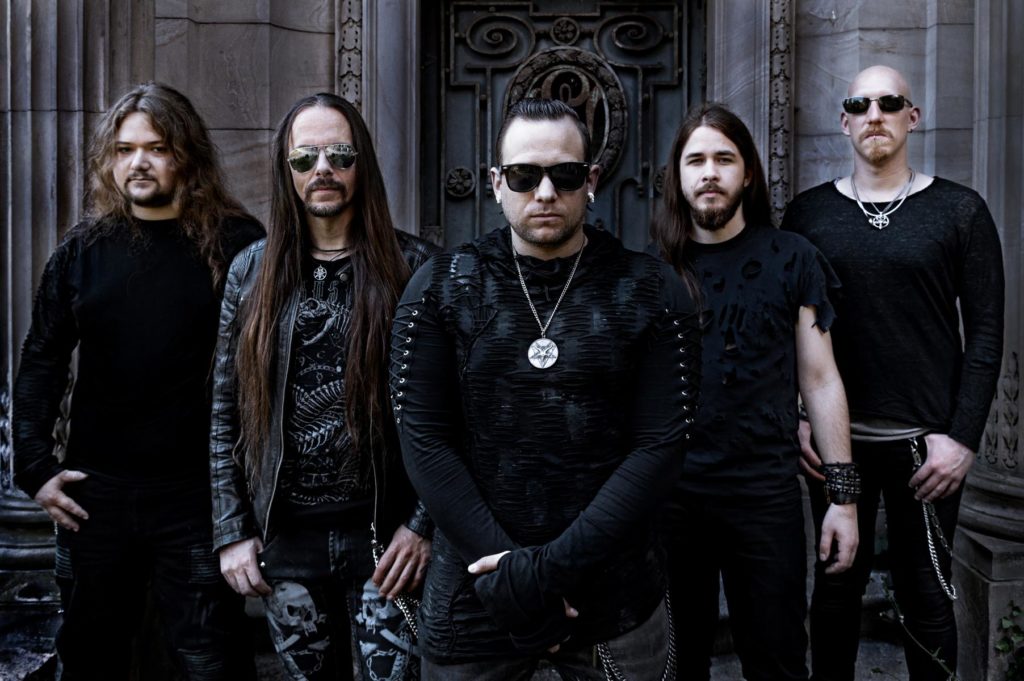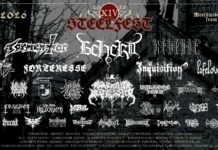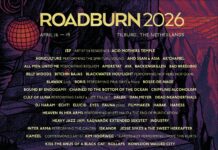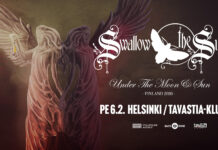Symphonic black metal act AGATHODAIMON recently reunited with a brand new album, “The Seven.” We talked with guitarist Martin “Sathonys” Wickler about the release. Read the complete interview below…

Hi there! Thank you so much for taking the time and do this interview. How are you doing?
I’m fine, I would say. I’m happy that after this long break we can finally release a new album and that there is still interest [in it] and people still want to hear our music after such a long time, so yes, it’s awesome.
If I counted correctly, it was 9 years ago that you released your previous album, right?
Yeah, I won’t say it feels like yesterday, that’s not true, it feels a bit weird that there’s been such a long gap in between.
I read online that due to private circumstances you were forced to put a hold on the band in 2014. Was it always the plan to come back to the scene with this band or how did you guys decide to do a comeback?
Back then, the reasons were quite simple, I was just… to put it short, my second child was on its way, so family just had to be [the most] important. I was well aware that it was not possible to get the band and somehow family both into the same 24 hours of a day, so… it was a similar situation with the other members of the band as well, so we said, let’s take a break here and just see when we can continue. It took a bit longer than expected, but it’s just the way how things went. We tried in 2018 to reunite, we did, did auditions, but that was a rather lengthy process, just to make sure that the chemistry is still there and the band can continue in a good way. In 2020, we actually were ready, and then, you know, corona… so there was again another delay. We would have expected maybe 6 years, not 9, but that’s the way things go sometimes.
You mentioned that you also had to do new auditions in 2018. What was that process like for you?
It was a bit sad that we couldn’t just reunite with the same lineup than before, because “In Darkness,” the previous album and the way it was done, I was really happy with it, but some of the lineup back then, Manuel our drummer, for example, he wanted to remain active, he’s a drum teacher, professionally, he does make a living off playing drums and teaching drums, and of course, then he can also use the opportunity to join a band, so he joined THE SPIRIT and they released a new album. It wouldn’t make much sense to just try and convince him to come back, both bands at the same time is not a good idea. Then there’s Thilo,our guitar player, he just lost interest in playing live after a while and yeah, he is not active anymore. Then Till, our former bass player, he just quit the metal scene; he’s still active, but he is more in the progressive rock segment. So we had to find three new musicians and, of course, that is quite a big thing to handle. There were a lot of auditions coming, we had advertising out there and had to ask friends whether they knew someone who might be able or who would want to join. Then the first people you audition, sometimes they are skilled on their instrument, but then maybe the chemistry isn’t there, you realize that okay it’s not someone I want to hang out with after a gig, so it took us a while actually.
What what kind of elements in their personality or their playing capabilities was what convinced you that the new members had to be part of the band?
I think, of course, the main ingredient is that they are capable of playing the instrument in the way that they can play the old stuff in a nice fashion and they’re able to improvise a bit, and add their own contributions. I never wanted to be in a band where someone dictated that it has to be like this, no please don’t hit the snare like this. It’s just having a certain maturity as a musician, but on the other hand, it was important that we get along well. It had to fit on a personal level as well. I couldn’t rate it in a sentence what’s more important, but I think both are equally important, especially if you don’t want to have the business focus in mind, where you want to have the best guitarist ever, and you don’t even care what kind of person it is. I think we were quite lucky that we found skilled musicians and also nice persona, so to say.
I guess the bigger the band, the more likely the band members can’t get along, because it’s a “business.” I guess for you guys it might also be important to take into account that you have to spend time on a tour bus together.
Exactly. Of course, you want them to feel well and not have the assumption that they are only hired guns or so and just do it for money reasons. Of course, there has to be the fun aspect that makes it interesting, that’s important.
Now, you mentioned that the first idea to come back was in 2018, but you really started during the pandemic. Was that also when you started writing music or did you have a backlog of songs still?
Of course, there is always some material that was maybe put somewhere on tape or on hard disk, things like that, that riff back then, but my main driver, my main idea, of course, was that I needed to find out whether we fit together as a band and whether the songwriting works out with the new members. We used mostly new ideas and tried to make sure the contributions of the new guys would fit and still, in the end, would sound like AGATHODAIMON. I think that’s the aspect we were mostly focused on, not just trying to push through, that this is the riff I want to have played, but if another guitarist had a better one that’s fine, but we needed to make sure that somehow the sound is there and the proper spirit so that it’s still fitting into our cosmos.
I’m not sure how your band used to write music, but do you feel like it changed a lot considering there are new members and a new time 9 years later?
I wouldn’t think so. We had those aspects already like working together as a band in a rehearsal room and writing more or less a song from scratch, but nowadays, you have easy methods to compose using digital audio work stations and recording multiple tracks. Back in the day, when we started out, you had 4-track tape recorders or something, so it was always a bit tricky, having a drum pattern below. It wasn’t easy back then. Nowadays, you can have easy methods to just work on a core of a song and then do the final work, the finetuning with the band. It happens that there’s a song which is more or less ready to go, and then we just do some finetuning together, but there are also songs that tend to get torn apart from the first version, because somebody says hey what about this riff, and then we try that out, take some other elements, and then the drummer comes up with a certain drum pattern and from there, we could go into a different part, so the song just develops over time and there’s a lot of different ways a song can come together. That was also the case in earlier times. Mostly, there are the basic elements, done by one person, and then the others contribute, that is the main aspect. Either Nakhateth, who contributed a lot to the album, comes up with a song proposal or something from me and then we work together as a band, that is how the main thing goes.
Do you think you can feel the chemistry you have in the band in your music?
I would say so, yes. In the beginning, when we got to meet the new band members, you’re always a bit skeptical because I’ve had some good experiences, but also have had some bad experiences, where you just found out after certain time that maybe this person is just too exhausting. I’m a pessimistic guy rather than optimistic, so it took a while to – I wouldn’t say to convince me – but just to feel relieved and now we have had all these moments together and it feels still nice, so I can be a bit more relaxed because having a stable lineup that you feel comfortable with is something that is really really important and you just can’t force it, so that was nice… And I totally lost track of your question, I think.
My question was whether you can hear the chemistry in the music. So I think your answer was spot on.
I think so because everyone more or less was able to contribute ideas. There are some nice guitar solos by Nakhateth, for example. We do have some expressionistic drum patterns by Mortos, our new drummer, and also our new bass player Jansch, he’s quite skilled, and there are some tiny bass lines here and there which are very spicy, so yeah, I think you can hear that the chemistry is quite nice at the moment.
The upcoming album is titled “The Seven,” which is also your seventh studio album. Did you have the idea beforehand to symbolically have a theme surrounding the seven deadly sins?
Of course, before we start out with a new album, we think about some aspects; for instance, what is the big picture or something. Then you start thinking about what it might sound like and it took quite a while because I think it’s a difficult topic; there have been movies, books, and other bands having concept albums around the seven deadly sins, so I tried not to focus on it too much, but I liked the idea so much because, on the previous album, “In Darkness,” we had this song “Favourite Sin,” which is also targeting one of the seven deadly sins. That was my favorite track, honestly, on that album, so it felt a bit natural I’d say. Okay, there have been other bands, but why not make it too obvious, we will call the album “The Seven.” There are always other meanings anyway, the number seven is just so big and there are a lot of relations to mythology and religion, daily life, related to this very powerful number. I didn’t just want to put the finger on it that it’s the seven sins, but in the end, we have the lyrics and the songs, they are more or less touching these aspects. There’s a song about greed, a song about lust, and so on. Also, the artwork is reflecting this, that is the main aspect, but it’s not just something I just want to point out all the time so to say.
Actually, that’s interesting because that was going to be one of my questions, whether there was a relation to the song on the previous record. The seven deadly sins are a grouping and classification of vices within Christian teachings, which is a fairly religious theme and thus interesting for a symphonic black metal band to write about. Why did you guys decide to pick it as a theme?
I mean, I think one obvious aspect is probably because I still see the band connected towards the black metal scene somehow, still the root of the band and also when it was founded, black metal was obviously the main driver, so there is always a certain – I wouldn’t say antipathy – but antipathy against religion in general, and especially against Christianity, because that is the religion we know most. We know it from school and from our daily life. It’s just everywhere, if you behave in public, your social behavior or whatever, these things were more or less influenced or defined by church; how do you live a relationship, how do you live in monogamy, you marry someone, you stay faithful, there are a lot of things that are just in our life and what I’m puzzled about is that there are still people who believe in God or Satan. Nowadays, we know so much about science, we know how the universe is and the physics and so on, you don’t believe in weird supernatural beings, so to say, but still you believe in a concept like the seven deadly sins. Partially, you have to stay away from that, but they are rooted so deep inside everyone of us to certain extend, you can debate whether it’s really the ultimate evil or whatever, of course, to a large extend it’s negative but still, there’s a lot of negativity in everyone of us, when it comes to greed, to something you can’t have, to lust maybe, or whatever, I mean there’s hate, wrath, these are things that belong to each one of us, but we neglect them, we don’t just embrace them in a way that we can see that it is something that can be discussed or can be seen from a different perspective. It’s all from this Christian perspective you put on so many things in our daily lives without reflecting and therefore I thought it’s still something that is valid in our daily life even though it sounds so old, so outdated.
Yeah no, I think that’s a valid point. I’m originally from Belgium and I found out a few years ago that there’s a thing called Catholic guilt, where you do something that is not approved by the Catholic church, you feel bad about it, and you repent. Generations later, I feel like that is still a part of our culture, even though not every child is raised Catholic, we apologize a lot.
Yeah, exactly, that’s some of the aspect there. The church was using these concepts to keep people more or less under control. There was a large number of people that didn’t have any chance in life to make something out of their lives; think about those during the Middle Ages maybe, or the times before that. If you were born rich, you remained rich, but if you were born poor, what could you do, but keep them under control like “okay this life might suck, but the afterlife, just be a good boy, behave, and don’t sin, and then in the next life you will have something nice and fancy.” This is just so weird in some aspects, but still we have this in our social life that we try to neglect, but we don’t question what is good what is bad or how we live nowadays, what is a good way to have a relationship and marriage, and whatever, there are so many divorces nowadays, but you should focus on how human beings are and what their feelings are instead of just trying to repeat things that were maybe defined 2000 years ago or so.
Yeah, that’s interesting. So, obviously, I think the message you have is also very subtle. It’s not that you’re saying like we hate religion, as some black metal bands do in a bit of an extreme way. Is that sort of important for you to give people maybe new perspectives while listening to your music?
Exactly, it’s not that I think I have to teach a certain message or so. That would be somehow the same approach that religions somehow have. But trying to think and just reflect about your surroundings and your inner self, I think that is more important than “fuck Jesus”; that is more childish stuff I think.
Now, going on to some of the songs. One of my personal favorite tracks is “Mother of All Gods.” Is there anything interesting story-wise or musically you can tell about that song?
Yeah, I could tell a lot but I try to keep it short because it would be too long. But that is actually the song where our former vocalist, Vlad Dracul – one of the members of the first lineup when we formed the band in 1995 – participated again, for the first time since 1999. We had his contribution in there. You might know from the history of the band that he left the band around 2000 or 2001. He was a native Romanian but he was living in Germany under the circumstances of Ceaușescu’s regime back then. When he returned after recording the demo in Romania voluntarily, Germany said after he wanted to return that he wasn’t a refugee anymore so he couldn’t stay there anymore, since Romania was a safe country now. So we were fucked. We couldn’t bring him back, legal or non-legal methods, it didn’t work out, that was also the reason why we recorded the second album in Romania, because we wanted him to participate again, but even afterwards, we knew that it is not possible. We can’t bring him back so he left the band, but we remained friends all these years and I’m always chatting a bit with him, about what he’s doing.
He’s still actively doing music, most of his stuff is not released, but he is still working on some electronic stuff more, and he just showed me yeah this keyboard song, there was a primitive trumpet track below, but the main keyboard elements of “Mother of All Gods” was already there and it reminded me a lot of old AGATHODAIMON. We talked and thought whether we could make it fit AGATHODAIMON somehow and so the song grew. He also contributed to the lyrics and I said okay there’s so much Vlad Dracul in there now, we should also have your vocals, so he recorded vocals in a studio in Bucharest in Romania.
We mixed it then in our Kohlekeller Studio with Ashtrael‘s vocals and I think the reason why it stands out so much is not only because it’s such a nice song – I like it very much – but also because he is usually composing on keyboards, so the song is very keyboard-oriented. There is a lot of symphonic stuff going on, many layers of keyboards and typically, when we write songs, our guitarist Nakhateth and I, we use guitar as the main instrument and then we put some keyboards on top or below, but in that aspect the guitars came last. I think it’s the song that stands out most on the album.
It’s actually a great story behind it. Do you feel like that song is a full circle moment?
I haven’t thought about it from that perspective, but it really felt awesome to me that after so many years we managed to have him contribute to the band again and that it felt… AGATHODAIMON-style somehow. After all these years, we were able to re-ignite that spark that we had in the beginning, it was similar to the feeling when I reformed the band with the new members and we started working on the first song, “Ain’t Death Grand.” That was really same feeling I had when we formed the band in 1995 and that was something I haven’t had in the previous albums. It felt like a fresh start.
There’s a track on the album named “Kyrie / Gloria.” Kyrie Eleison is of course a popular prayer. Yet, a lot of classical composers (eg. Mozart) have also used it in their music. To what extent is classical music important to you?
Classical music, of course, is impressive both from the sound itself, from the way it’s structured, mostly from the compositions, which are not comparable to typical 5-minute songs that have a chorus and a verse. What we’re doing is, of course, not to be compared to any classical music, but there are some influences here and there. I think it’s rather subconscious, this feeling that classical instruments may evoke, like violins or just trombones or whatever. We do have these heavy elements, this symphonic, epic stuff that’s something I really enjoy and it happened that there are some things that [are reminiscent] of certain classical things, but I would never go that far. There are bands like SEPTICFLESH who do it in a perfect way, but we’re faraway from that, to some extent it’s there, but it’s not something that is dominating the music.
Now, of course, there’s still a little bit of uncertainty with corona, but do you have any plans for touring Europe?
We hope so! Playing live is at least my favorite thing about being in a band, because writing songs is just always a painful process to me. I’m always very doubtful whether this riff is good enough or whether somebody will like it. I’m not always happy with the things I actually create myself, so playing live is just the best thing; getting direct feedback from the audience and just performing, that is something I’m looking forward to, but it’s not that easy at the moment. Of course, we need to make sure that it fits the other band members’ schedules. At least in Germany, corona is still a little bit unsure, when the venues will open up. We’re currently trying to have a local gig here in our region in early April, then there are still some festivals that are still pending from 2020 that we want to bring over, like Ragnarök. I hope this is going to happen because it’s quite a nice and bigger festival here in Germany. Then there’s the Metal Gates Festival in Romania and we just 2 days ago announced another festival in summer, where we will play in Germany. Hopefully, there will be more to come. Right now, I’m still quite busy with preparing and filming our new video, the previous weekend for “Kyrie / Gloria” actually. That was quite a nice thing to go and now cutting the video might take some effort and editing it, but afterwards I hope we can focus on trying to see where we can just play live.
Has it been 9 years as well since you’ve been on stage or have you been able to play a show meanwhile?
We’ve had one gig last November where there was a short gap between all these corona lockdowns where things went better, then we were able to play and then things became worse again and we weren’t allowed anymore, but we had this sweet spot where we were able to play a nice little festival in Germany in the North-East. That was nice.
Well, must be nice for you to get back on stage! That’s it for my questions, thanks so much. Do you have any last thoughts you want to share with your fans?
Yeah, of course, thanks for the support given here, I’m always happy that there’s media in Finland actually covering us. I do have a sweet spot for Finland since my tape trading days, when I was starting out as a metal fan and doing tape trading stuff. There was this magazine, Isten, by Mikko Mattila, I was really a fan of. That was one of the best moments… we had an interview there with our second demo, both Isten and Slayer Magazine from Norway, but these were the two things, milestones I wanted to achieve with the band. Finland, also was always one of the main markets, I’m always happy when someone is interested in the band!
Written by Laureline Tilkin





